|
|
|
Sort Order |
|
|
|
Items / Page
|
|
|
|
|
|
|
| Srl | Item |
| 1 |
ID:
151339
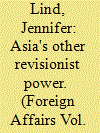

|
|
|
|
|
| Summary/Abstract |
Donald Trump’s election as U.S. president threatens to upend the world’s most important bilateral relationship. On the campaign trail, Trump promised to label China a currency manipulator and to respond to its “theft of American trade secrets” and “unfair subsidy behavior” by levying a 45 percent tariff on Chinese exports [2]. As president-elect, he reversed four decades of U.S. policy when he spoke by telephone with Taiwanese President Tsai Ing-wen and declared [3] that the United States was not bound by the “one China” policy, the diplomatic understanding that has underpinned Washington’s approach to Beijing since 1979.
|
|
|
|
|
|
|
|
|
|
|
|
|
|
|
|
| 2 |
ID:
180365
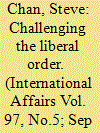

|
|
|
|
|
| Summary/Abstract |
Current discourse on International Relations conflates international order and the interstate distribution of power. Many studies fail to clarify the concept of international order or to provide systematic empirical analysis that compares states' conduct in relation to this order. The prevailing tendency relies instead on rhetorical assertion or definitional fiat to attribute revisionist and status-quo motivations to different countries. For example, power-transition theory claims that rising states are typically revisionist, whereas established states are committed to the status quo. This article presents a contrarian view, arguing that the dominant or established state can be a revisionist. This state is not forever committed to those rules and institutions of international order that it has played a decisive role in fostering. Conversely, a rising state is not inevitably bent on challenging the order that has enabled its ascendance. Revisionism is thus not unique to a rising power; moreover, this state is not destined to be a challenger to international order and an instigator of systemic war as typically depicted in the current literature. I advance these propositions in the context of recent conduct by China and the US, suggesting that whereas China has become less revisionist over time (even while its power has increased), the US has become more so especially during the Trump administration. The major impetus challenging the liberal international order has come more from domestic sources in the West than from China.
|
|
|
|
|
|
|
|
|
|
|
|
|
|
|
|
| 3 |
ID:
178695
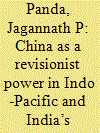

|
|
|
|
|
| Summary/Abstract |
Debate concerning China’s emergence as a revisionist power has taken a more direct shape under the Donald Trump administration in the United States. Such a debate is not as prevalent in India even though New Delhi began perceiving Beijing’s assertive rise long-ago with caution. India’s deductions of China as a revisionist power are drawn on its national security calculus and the anticipatory challenges it faces from China in the land and maritime domain that threatens the status-quo of the region. In other words, India's perception of China in Indo-Pacific is much more constructive, drawn on a dualist outlook of power-partner contention, that comes both as a challenge as well as opportunity.
|
|
|
|
|
|
|
|
|
|
|
|
|
|
|
|
| 4 |
ID:
093908
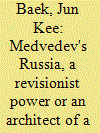

|
|
|
| 5 |
ID:
159111
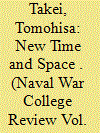

|
|
|
|
|
| Summary/Abstract |
China’s aggressive land-reclamation projects in Asian waters represent a challenge to the status
quo. The international system, the United States and Japan, and smaller countries seeking regional
stability must reexamine their concepts of time and space if they are to better deter the designs of a
revisionist power.
|
|
|
|
|
|
|
|
|
|
|
|
|
|
|
|
| 6 |
ID:
143553
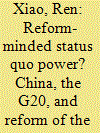

|
|
|
|
|
| Summary/Abstract |
This paper analyses the case of China in the G20 process and examines China’s position and policies on relevant issues, including international monetary system reform, reform of the international financial institutions (IFIs), international financial regulation, the future of the dollar, and internationalisation of the renminbi. My findings demonstrate that China has actively participated in the G20’s deliberations and actions, put forward its suggestions, sought an expanded share and voting power in the IFIs in correspondence with its rising status, and promoted the internationalisation of the renminbi. It does not aspire to overthrow this system within which it has prospered. In this sense China is a status quo power. Meanwhile China argues that the current international order is flawed and that there exist a number of unjust and unreasonable components. They have long needed to be changed. My conclusion is that China is not a complete but rather a reform-minded status quo power.
|
|
|
|
|
|
|
|
|
|
|
|
|
|
|
|
| 7 |
ID:
130469
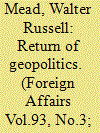

|
|
|
|
|
| Publication |
2014.
|
| Summary/Abstract |
So far, the year 2014 has been a tumultuous one, as geopolitical rivalries have stormed back to center stage. Whether it is Russian forces seizing Crimea, China making aggressive claims in its coastal waters, Japan responding with an increasingly assertive strategy of its own, or Iran trying to use its alliances with Syria and Hezbollah to dominate the Middle East, old-fashioned power plays are back in international relations. The United States and the EU, at least, find such trends disturbing. Both would rather move past geopolitical questions of territory and military power and focus instead on ones of world order and global governance: trade liberalization, nuclear nonproliferation, human rights, the rule of law, climate change, and so on. Indeed, since the end of the Cold War, the most important objective of U.S. and EU foreign policy has been to shift international relations away from zero-sum issues toward win-win ones. To be dragged back into old-school contests such as that in Ukraine doesn't just divert time and energy away from those important questions; it also changes the character of international politics. As the atmosphere turns dark, the task of promoting and maintaining world order grows more daunting. But Westerners should never have expected old-fashioned geopolitics to go away. They did so only because they fundamentally misread what the collapse of the Soviet Union meant: the ideological triumph of liberal capitalist democracy over communism, not the obsolescence of hard power. China, Iran, and Russia never bought into the geopolitical settlement that followed the Cold War, and they are making increasingly forceful attempts to overturn it. That process will not be peaceful, and whether or not the revisionists succeed, their efforts have already shaken the balance of power and changed the dynamics of international politics.
|
|
|
|
|
|
|
|
|
|
|
|
|
|
|
|
|
|
|
|
|